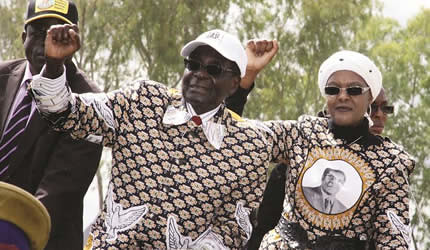
Republic of Zimbabwe President Robert Mugabe with First Lady Amai Grace at Nzvimbo High School Rally in Chiweshe, Mashonaland on July 11, 2013., a photo by Pan-African News Wire File Photos on Flickr.
Editorial Comment: Zanu-PF emerges united
Sunday, 15 December 2013 00:00
Zanu-PF’s 14th Annual National People’s Conference in Chinhoyi has come and gone.
What will the meeting be remembered for? President Mugabe’s clarity of thought, unassailable leadership, and the profundity of his vision were once again the rock on which the nation’s dreams and aspirations were anchored. When he speaks, you are not left wondering what his agenda is.
Quite clearly, Zanu-PF now requires a dozen more Mugabes to take this superb vision to the four corners of Zimbabwe and give it practical expression. In that cryptic metaphor we may find the missing piece of the jigsaw.
What the conference is remembered for will also depend on what happens after this. If Zanu-PF, as the vanguard party, takes this opportunity to ride on the positive vibe created by the conference, the nationalist movement will be in a brilliant position to deliver on its popular mandate and lay the groundwork for re-election in 2018.
More importantly, if Zanu-PF rides on this momentum and impeccably delivers on its election promises, the party would have managed to kill two birds with one stone: secure the party’s electoral prospects while safeguarding the nation’s sovereignty.
Quisling politics is not dead, it has only gone into hibernation. Should an opportunity arise, the regime-change gang will be exhumed from the political graveyard and resurrected for all manner of nefarious intentions.
Of all the critical issues that have preoccupied the national political discourse since Zanu-PF’s victory in the July 31 election, none has generated more heated discussion than the tantalising question: Is Zanu-PF ready to embrace internal democracy? This question continues to crop up in almost every political chat out there.
The chaos which plagued the provincial executive elections was a stark reminder of what happens when strange tendencies take root. Democratising Zanu-PF, it seems, is a topic that has captured the imagination of journalists, politicians and the general public.
However, it is simply untrue that Zanu-PF is inherently undemocratic. This is a movement that brought democracy to the masses, therefore its DNA cannot be primitively autocratic. The party defeated racist domination and oppression just yesterday.
Zanu-PF has to guard against service delivery failure, corruption, undemocratic behaviour and incompetence.
The party has been too tolerant of incompetence, with the end result that some comrades in the nationalist movement are of the belief that they are assured of their plush posts even when they fail to carry out assigned tasks.
It beggars belief that a party which has in the past tasted humiliation after taking the electorate for granted does not see the need to recall non-performers.
Zanu-PF’s deployees in Government must know that they carry a very serious responsibility to uphold the honour of a party that has become one of the most formidable political brands in Africa.
Zanu-PF’s liberation credentials are impeccable. With values firmly rooted in the struggle for self-determination, the party rarely suffers from the ideological malaise that has characterised fly-by-night political outfits which are funded by Western governments.
But herein lies the nub. Despite these top-notch credentials, Zanu-PF can no longer depend solely on its liberation track record to garner mass support and remain in power.
The party must offer much more than just slogans; it must retain relevance by addressing the pressing needs of Zimbabweans.
In a nation blighted by countless maladies ranging from high infant mortality to industrial collapse, there is no substitute for performance.
A party that wins an election in a spectacularly emphatic manner—as Zanu-PF did on July 31 — has huge responsibilities and must remain alive to the fact that there is a thin line between an abundance of public goodwill and a crisis of expectations.
In that connection, it is safe to surmise that Zanu-PF’s electability or lack thereof in the 2018 election will directly depend on the performance of the ruling party’s Government. That is why patriotic Zimbabweans were growing impatient with the intra-party squabbles .
The party has to become more responsive and accountable.
Being responsive means addressing the needs and concerns of the masses. It means putting the people first. It also means that Zanu-PF leaders must always remember that they are servants and representatives of the people rather than haughty masters who never listen to the rank and file.
Being accountable means that the party must now stop paying lip service to the fight on corruption and start taking decisive action to restore public confidence in that regard. In extremely alarming ways, corruption is threatening to erode the gains of liberation.
The failure to tackle corruption is now being used as ammunition by the enemies of Zimbabwe who are peddling the false propaganda that this nation is defined by sleaze and not by the indomitable founding values and principles that are enshrined in our new Constitution.
Zanu-PF has come out of the National People’s Conference united, focused and energised.
Implementing the Zimbabwe Agenda for Sustainable Socio-Economic Transformation (Zim Asset) is the only game in town.
No comments:
Post a Comment